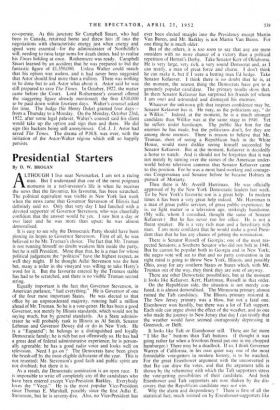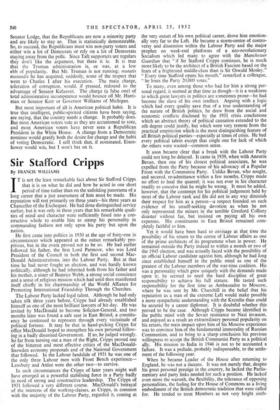Presidential Starters
By D. W. BROGAN
ALTHOUGH I live near Newmarket, I am not a racing man. But I understand that one of the most poignant moments in a turf-investor's life is when he receives the news that the favourite, his favourite, has been scratched. The political equivalent was visible in New York last week when the news came that Governor Stevenson of Illinois had definitely said no. Only that very day I had lunched with a devoted supporter of Governor Stevenson, who was cheerfully confident that the answer would be yes. I saw him a day or two later and he was more than upset; he was almost demoralised.
It is easy to see why the Democratic Party should have been pinning its hopes to Governor Stevenson. First of all, he was believed to be Mr. Truman's choice. The fact that Mr. Truman is not running himself no doubt weakens him inside the party, but he is still President. More than that, he is a man for whose political judgement the "politicos" have the highest respect, as well they might. If he thought Adlai Stevenson was the best bet, many a toiler in the vineyard was willing to take Harry's word for it. But the favourite entered by the Truman stable has had to be scratched, and there is no visible Truman second string.
Equally important is the fact that Governor Stevenson, in American parlance, " had everything." He is Governor of one of the four most important States. He was elected to that office by an unprecedented majority, running half a million ahead of Mr. Truman. So he is a vote-getter. He has been a good Governor, not merely by Illinois standards, which would not be saying much, but by general standards. As a State adminis- trator he will probably rank in Illinois as Al Smith, Senator Lehman and Governor Dewey did or do in New York. He is a "Eupatrid"; he belongs to a distinguished and loyally Democratic family; he is rich but not offensively so. He has had a great deal of federal administrative experience; he is person- ally agreeable; he has a good radio voice and looks well on television. Need I goon ? The Democrats have been given the brush-off by the most eligible debutante of the year. This is not resented; Mr. Stevenson's good faith and public spirit are not doubted; but there it is.
As a result, the Democratic nomination is an open race. It is impossible to write off completely any of the candidates who have been entered except Vice-President Barkley. Everybody loves the " Veep." He is the most popular Vice-President since Thomas E. Marshall, possibly since the first Adlai E. Stevenson, but he is seventy-five. Also, no Vice-President has ever been elected straight into the Presidency except Martin. Van Buren, and Mr. Barkley is not Martin Van Buren. For one thing he is much older.
But of the others, it is too soon to say that any are mere outsiders with no more chance of a victory than a political repetition of Hermit's Derby. Take Senator Kerr of Oklahoma. He is very large, very rich, a very sound Democrat and, as I can testify, a man of great force and charm. I don't think he can make it, but if I were a betting man I'd hedge. Take Senator Kefauver. I think there is no doubt that he is, at the moment, the nearest thing the Democrats have got to a genuinely popular candidate. The primary results show that. In them Senator Kefauver has surprised his friends (of whom I am one) and astounded and dismayed his enemies.
Whatever the unknown gift that inspires confidence may be, Senator Kefauver has it. He may, as the politicians say, " do a Willkie." Indeed, at the moment, he is a much stronger candidate than Willkie was at the same stage in 1940. Yet he suffers under handicaps. The public like him for the enemies he has made, but the politicians don't, for they are among those enemies. There is reason to believe that Mr. Truman, short of seeing a Republican back in the White House, would most dislike seeing himself succeeded by Senator Kefauver. But at the moment, Kefauver is decidedly a horse to watch. And it should not be forgotten that it was not merely by turning over the stones of the American under- world before television cameras that Senator Kefauver came to this position. For he was a most hard-working and courage- ous Congressman and Senator before he became Holmes in pursuit of Moriarty.
Then there is Mr. Averill Harriman. He was officially approved of by the New York Democratic leaders last week.
To be New York's favourite son is a great help. In modern times it has been a very great help indeed. Mr. Harriman is a man of great public services, of great public experience; he is, no light matter in a television age, strikingly handsome.
(My wife, whom I consulted, thought the same of Senator Kefauver.) But he has never run for office. He is not a fluent speaker. He is a very rich man and a hereditary rich man. I am more confident that he would make a good Presi- dent than that he has any chance of getting the nomination.
There is Senator Russell of Georgia; one of the most res- pected Senators; a Southern Senator who did not bolt in 1948.
But he cannot be popular both in Georgia and in New York; the negro vote will see to that and no party convention in its right mind is going to throw New York, Illinois, and possibly Ohio, away for any southern States or States which, with Mr. Truman out of the way, they think they are sure of anyway.
There are other Democratic possibilities, but at the moment it looks like Kefauver, Kerr, Harriman, Russell in that order.
On the Republican side, the situation is not merely con- fused, it is almost demoralised. The Minnesota primary almost ruined the Taft candidacy. The Illinois primary restored it.
The New Jersey primary was a blow, but not a fatal one. Eisenhower won handily, but there was a lot of Taft support.
Each side can argue about the effect of the weather, and as one who made the journey to New Jersey that day I can testify that the weather would have seemed outrageously depressing in Greenock, or Delft.
It looks like Taft or Eisenhower still. There are far more " I like Ike " buttons than Taft buttons. (I thought it was going rather far when a frivolous friend put one in my chopped hamburger.) There may be a deadlock. If so, I think Governor Warren of California, in his own quiet way one of the most formidable vote-getters in modern history, is to be watched. For the great Eisenhower argument with the unconverted is that Ike can draw the votes, and that the argument tells is shown by the vehemence with which the Taft supporters stress the vote-getting possibilities of their candidate. And both Eisenhower and Taft supporters are now shaken by the dis- covery that the Republican candidate may not win.
Why the alarm and despondency ? There is first of all the statistical fact, much insisted on by Eisenhower-supporters like Senator Lodge, that the Republicans are now a minority party and are likely to stay so. That is statistically demonstrable. So, to succeed, the Republicans must win non-party voters and either win a lot of Democrats or rely on a lot of Democrats staying away from the polls. Since Taft supporters are regulars they don't like the argument, but there it is. It is true that the Truman administration is, or was, at a low ebb of popularity. But Mr. Truman is not running; mutatis mutandis he has acquired, suddenly, some of the respect that went to Charles I after his execution. The main charge, toleration of corruption, would, if pressed, redound to the advantage of Senator Kefauver. The charge (a false one) of total administrative incompetence would bounce off Mr. Harri- man or Senator Kerr or Governor Williams of Michigan.
But most important of all is American political habit. It is true that intelligent, public-spirited citizens have been saying, are saying, that the country needs a change. It probably does. But most American voters vote as they are accustomed to vote, and most American voters have never seen a Republican President in the White House. A change from a Democratic nominee would gratify both the desire for change and the habit of voting Democratic. I still think that, if nominated, Eisen- hower would win, but I won't bet on it.



































 Previous page
Previous page